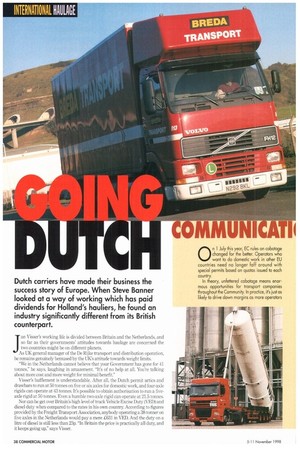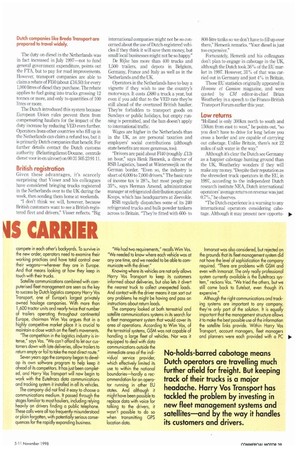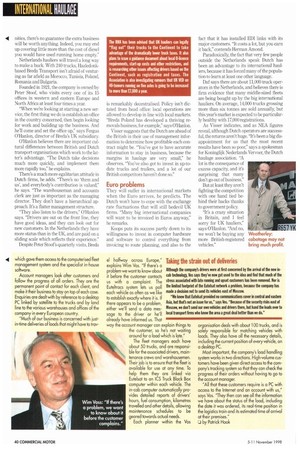INTERNATIONAL HAULAGE
Page 40

Page 41

Page 42

If you've noticed an error in this article please click here to report it so we can fix it.
Dutch carriers have made their business the success story of Europe. When Steve Banner looked at a way of working which has paid dividends for Holland's hauliers, he found an industry significantly different from its British counterpart.
Jan Visser's working life is divided between Britain and the Netherlands, and so far as their governments' attitudes towards haulage are concerned the Iwo countries might be on different planets. As UK general manager of the De Rijke transport and distribution operation, he remains genuinely bemused by the UK's attitude towards weight limits.
"We in the Netherlands cannot believe that your Government has gone for 41 tonnes," he says, laughing in amazement. "It's of no help at all. You're talking about more cost and more Weight for minimal benefit," Visser's bafflement is understandable. After all, the Dutch permit artics and drawbars to run at 50 tonnes on five or six axles for domestic work, and four-axle rigids can operate at 43 tonnes, It's possible to obtain authorisation to run a fiveaxle rigid at 50 tonnes. Even a humble two-axle rigid can operate at 21.5 tonnes.
Nor can he get over Britain's high level of truck Vehicle Excise Duty (VED) and diesel duty when compared to the rates in his own country. According to figures provided by the Freight Transport Association, anybody operating a 38-tanner on five axles in the Netherlands would pay a mere £631 in VED. And the duty on a litre of diesel is still less than 23p. "In Britain the price is practically all duty, and it keeps going up," says Visser. The duty on diesel in the Netherlands was in fact increased in July 1997—not to fund general government expenditure, points out the FTA, but to pay for road improvements. However, transport companies are able to claim a rebate of F150 (about £16.50) for every 1,000 litres of diesel they purchase. The rebate applies to fuel going into trucks grossing 12 tonnes or more, and only to quantities of 100 litres or more.
The Dutch introduced this system because European Union rules prevent them from compensating hauliers for the impact of the duty increase by reducing VED even further. Operators from other countries who fill up in the Netherlands can claim a refund too, but it is primarily Dutch companies that benefit. For further details contact the Dutch customs authority (Belastingdienst/Douane, centrale dienst voor in-en uitvoer) on 00 31 505 23 91 11.
British registration
Given these advantages, it's scarcely surprising that Visser and his colleagues have considered bringing trucks registered in the Netherlands over to the UK during the week, then sending them home at weekends.
"I don't think we will, however, because British customers want to see a British-registered fleet and drivers," Visser reflects. "Big
international companies might not be so concerned about the use of Dutch-registered vehicles if they think it will save them money, but small local businesses might not be so happy"
De Rijke has more than 400 trucks and 1,500 trailers, and depots in Belgium, Germany, France and Italy as well as in the Netherlands and the UK.
Operators in the Netherlands have to buy a vignette if they wish to use the country's motorways. It costs £880 a truck a year. but even if you add that to the VED rate they're still ahead of the overtaxed British haulier. They're forbidden to transport goods on Sundays or public holidays, but empty running is permitted, and the ban doesn't apply to international traffic.
Wages are higher in the Netherlands than in the UK, as are personal taxation and employers' social contributions (although state benefits are more generous, too).
"Drivers are paid about F140 (roughly £13) an hour," says Henk Hemenk, a director of RSB Logistics, based at Winterswejik on the German border. "Even so, the industry is short of 6,000 to 7,000 drivers." The basic rate of income tax is 28%, but most people pay 35%, says Herman Amoncl, administration manager at refrigerated distribution specialist Koops, which has headquarters at Zeevolde.
RSB regularly dispatches some of its 240 refrigerated trucks and bulk powder tankers across to Britain. "They're fitted with 600to 800-litre tanks so we don't have to fill up over there," Hemenk remarks. "Your diesel is just too expensive."
Fortunately, Hemenk and his colleagues don't plan to engage in cabotage in the UK, although the Dutch took 36% of the EU market in 1997. However, 31% of that was carried out in Germany and just 4% in Britain.
Those EU statistics originally appeared in Homme el Camion magazine, and were quoted by CM editor-in-chief Brian Weatherley in a speech to the Franco-British Transport Forum earlier this year.
Low returns
"Holland is only 300km north to south and 150km from east to west," he points out, "so you don't have to drive for long before you cross a border and are capable of carrying out cabotage. Unlike Britain, there's not 22 miles of salt water in the way."
Although it's clear the Dutch see Germany as a happier cabotage hunting ground than the UK, Weatherley wonders if they will make any money "Despite their reputation as the shrewdest truck operators in the EU, in 1997, according to the independent Dutch research institute NEA, Dutch international operators' average return on revenue was just 0.7%," he observes.
"The Dutch experience is a warning to any international operators considering cabotage. Although it may present new opportu nities, there's no guarantee the extra business will be worth anything. Indeed, you may end up covering little more than the cost of diesel you would have used running home empty." Netherlands hauliers will travel a long way to make a buck. With 240 trucks, Haziedonkbased Breda Transport isn't afraid of venturing as far afield as Morocco, Tunisia, Poland, Romania and Bulgaria.
Founded in 1921, the company is owned by Peter Stoof, who visits every one of its 15 offices in western and eastern Europe and North Africa at least four times a year, "When we're looking at starting a new service, the first thing we do is establish an office in the country concerned, then begin looking for work and building up the business. And he'll come and set the office up," says Fergus (Manion, director of Breda's UK subsidiary.
O'Hanlon believes there are important cultural differences between British and Dutch transport organisations which work to the latter's advantage. "The Dutch take decisions much more quickly, and implement them more rapidly too," he explains.
There's a much more egalitarian attitude in Dutch firms, he adds. "There's no 'them and us', and everybody's contribution is valued," he says. "The warehouseman and accounts clerk are just as important as the managing director. They don't have a hierarchical approach. It's a flatter management structure.
"They also listen to the drivers," O'Hanlon says. "Drivers are out on the front line, they have good ideas, and they can look out for new customers. In the Netherlands they have more status than in the UK, and are paid on a sliding scale which reflects their experience."
Despite Peter Stoof's quarterly visits, Breda is remarkably decentralised. Policy isn't dictated from head office: local operations are allowed to develop in line with local markets. "Breda Poland has developed a thriving removals business, for example," says O'Hanlon.
Visser suggests that the Dutch are ahead of the British in their use of management information to determine how profitable each contract might be. "You've got to have accurate information to stay in business, because the margins in haulage are very small," he observes. "You've also got to invest in up-todate trucks and trailers, and a lot of our British competitors haven't done so."
Euro problems
They will suffer in international markets when the Euro arrives, he predicts. The Dutch won't have to cope with the exchange rate fluctuations that will still bedevil UK firms. "Many big international companies will want to be invoiced in Euros anyway," he remarks.
Koops puts its success partly down to its willingness to invest in computer hardware and software to control everything from invoicing to route planning, and also to the fact that it has installed EDI links with its major customers. "It costs a lot, but you earn it back," contends Herman Amond.
Paradoxically, the fact that very few people outside the Netherlands speak Dutch has been an advantage to its international hauliers, because it has forced many of the population to learn at least one other language.
Daf says there are about 11,000 truck operators in the Netherlands, and believes there is firm evidence that many middle-sized fleets are being bought up by the big international hauliers. On average, 14,000 trucks grossing more than six tonnes are sold annually, but this year's market is expected to be particularly healthy with 17,000 registrations.
As Visser indicates, and as NEA figures reveal, although Dutch operators are successful, the returns aren't huge. "It's been a big disappointment for us that the most recent results have been so poor," says a spokesman for Koninglijk Nederlands Vervoer, the Dutch haulage association. "A lot is the consequence of excess capacity and it's surprising that many don't go out of business."
But at least they aren't fighting the competition with one hand tied behind their backs thanks to government policy.
"It's a crazy situation in Britain, and I feel sorry for UK hauliers," says O'Hanlon. "And no, we won't be buying any Weatherley: more British-registered cabotage may not vehicles." bring much profit. 0 n 1 July this year, EC rules on cabotar changed for the better. Operotors who want to do domestic work in other EU countries need no longer faff around with speciai permits based on quotas issued to each country. In theory, unfettered cabotage means enormous opportunities for transport companies throughout the Community. In practice, it's just as likely to drive down margins as more operators compete in each other's backyards. To survive in the new order, operators need to examine their working practices and have total control over their wagons—wherever they are in Europe. And that means looking at how they keep in touch with their trucks.
Satellite communications combined with computerised fleet management are seen as the key to success by Dutch logistics company Harry Vos Transport, one of Europe's largest privately owned haulage companies. With more than 1,600 tractor units and nearly twice that number of trailers operating throughout continental Europe, chairman Wim Vos argues that in a highly competitive market place it is crucial to maintain a close watch on the fleet's movements.
"The competition in the logistics industry is intense," says Vos. "We can't afford to let our customers down with late deliveries, allow trailers to return empty or fail to take the most direct route.' Seven years ago the company began to develop its own software program to help keep it ahead of its competitors. It has just been completed, and Harry Vos Transport will now begin to work with the Euteltracs data communications and tracking system it installed in all its vehicles. The company did not find it easy to choose a communications medium. It passed through the stages familiar to most hauliers, including relying heavily on drivers finding a public telephone. These calls were all too frequently misunderstood or plain forgotten, with potentially serious consequences for the rapidly expanding business. "We had two requirements," recalls Wim Vos. "We needed to know where each vehicle was at any onetime, and we needed to be able to communicate with the driver."
Knowing where its vehicles are not only allows Harry Vas Transport to keep its customers informed about deliveries, but also lets it divert the nearest truck to collect unexpected loads. And contact with the driver means it can sort out any problems he might be having and puss on instructions about return loads.
Inmarsat was also considered, but rejected on the grounds that its fleet management system did not have the level of sophistication the company required. 'There are 'problems with GSM and even with Inmarsat. The only really professional system currently available is the Euteltracs system," reckons Vos. 'We tried the others, but we still came back to Eutelsat, even though it's expensive."
Although the right communications and tracking systems are important to any company, they're only part of the solution. It is equally important that the management structure allows it to make the best possible use of the information the satellite links provide. Within Harry Vas Transport, account managers, fleet managers and planners were each provided with a PC which gave them access to the computerised fleet management system and the specialist in-house software.
Account managers look after customers and follow the progress of all orders. They are the permanent point of contact for each client, and make it their business to stay on top of each case. Enquiries are dealt with by reference to a desktop PC linked by satellite to the trucks and by land line to the various warehouses and offices of the company in every European country. "Much of our business is concerned with justin-time deliveries of loads that might have to tray el halfway across Europe," explains Wim Vos. "If there's a problem we want to know about it before the customer contacts us with a complaint. The Euteltracs system lets us poll each vehicle as often as we like to establish exactly where it is. If there appears to be a problem, either we'll send a data message to the driver or he'll already have informed us. That way the account manager can explain things to the customer, so he's not waiting around for a load which is late."
The fleet managers each have about 50 trucks, and are responsible for the associated drivers, maintenance crews and warehousemen. Their job is to ensure that the fleet is available for use at any time. To help them they are finked via Eutelsat to an ICS Truck Black Box computer within each vehicle. The in-cab computer automatically provides detailed reports of drivers' hours, fuel consumption, kilometres travelled and other details, allowing maintenance schedules to be geared towards actual needs.
Each planner within the Vos
organisation deals with about 100 trucks, and is solely responsible for matching vehicles with loads. They also have all the necessary details, including the current position of every vehicle, an a desktop PC. Most important, the company's load handling system works in Iwo directions. High-volume customers have been given direct access to the company's tracking system so that they can check the progress of their orders without having to go to the account manager. "All that these customers require is a PC with access to the Internet and an account with us," says Vos. 'They then can see all the information we have about the status of the load, including the date it was ordered, its real-time position in the logistics train and its estimated time of arrival at their premises." Ii by Patrick Hook Taking the strain out of deliveries Although the company's drivers were at first concerned by the arrival of the new incab technology, Vos says they've now got used to the idea and find that much of the stress associated with late running and upset customers has been removed. Nor is the limited footprint of the Eutelsat network a problem, because the company has made a decision not to send its vehicles east of Moscow.
"We knew that Eutelsat provided no communications cover in central and eastern Asia, but that's not an issue for us," says Vos. "Because of the security risks east of Moscow, we don't send our own vehicles and drivers there, but hand the loads over to local transport firms who know the area a great deal better than we do."


























































































































